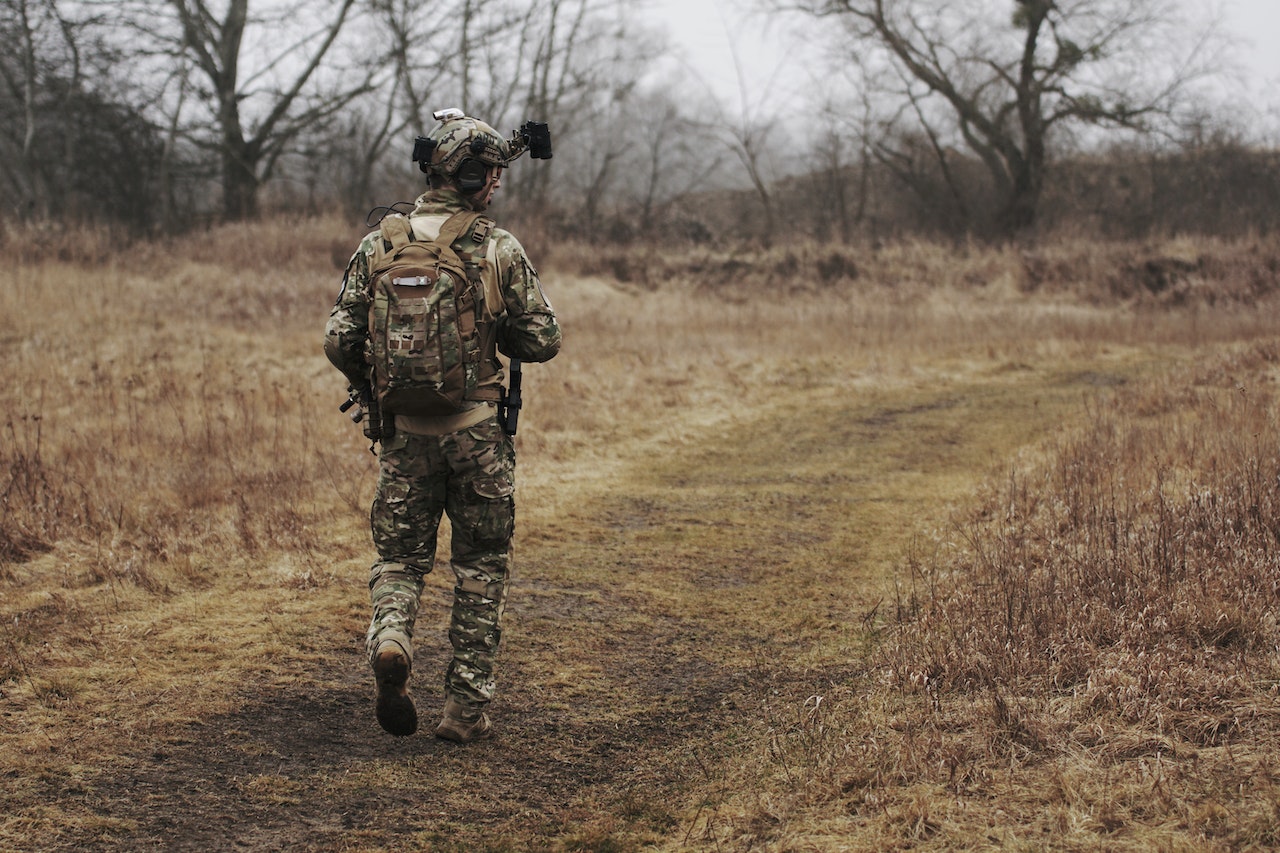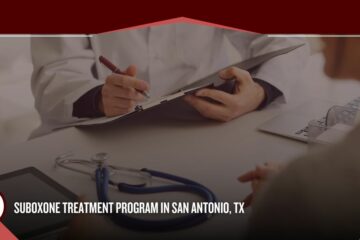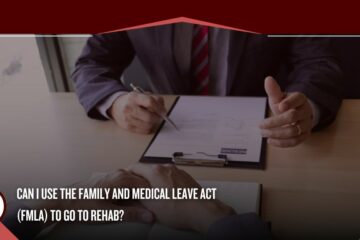Serving in the military, even in a non-combat role, can have lasting effects on your psyche. Even after your active duty is over and you’ve transitioned to civilian life, you could continue to experience the consequences of what you’ve been through. And you wouldn’t be alone either – anywhere between 10% and 80% of US veterans suffer from post-traumatic stress disorder (PTSD), depending on the type of service and time of deployment. PTSD is the second most common mental health issue in veterans, following closely behind sleep disturbances. Its severe symptoms cause many veterans to turn to substances for relief – PTSD and substance abuse in veterans often go hand in hand. For this reason, many veterans seek help with addiction at Alamo Behavioral Health. If you are struggling, you are not alone; help is out there, and with the right treatment and support, you can get better.
What is PTSD?
Post-traumatic stress disorder, or PTSD for short, is a mental health condition triggered by trauma. When the trauma is a singular event (such as a violent attack, a natural disaster, or a serious injury) the condition is considered non-complex. However, when the trauma occurs repeatedly or over a prolonged period of time (such as in the case of childhood abuse, captivity, or war), the condition is referred to as complex PTSD or C-PTSD.

When you experience a traumatic event, it is normal also to experience a decline in mental health following that event. You may have trouble sleeping, be more on edge than usual, and have anxiety surrounding situations similar to the one where you experienced trauma. These issues may even cause you to struggle in day-to-day life. But with time and self-care, you should see a marked improvement already within a couple of weeks. This is not the case when you have PTSD. Your symptoms will not lessen with time and may, in fact, even intensify. They will also last longer than what is considered normal – for months and sometimes even years.
Why do some people experience PTSD and some don’t?
Research has yet to find why some people develop PTSD in response to certain events while others with similar experiences do not. The likely culprit is a combination of genetic predisposition, personality, brain chemistry, and perceived severity of the event. But whatever the reason behind it, it’s important to remember that effective treatment for PTSD does exist. While it can take time, talk therapy and medication can drastically reduce and even completely get rid of symptoms. Cognitive behavioral therapy (CBT), eye movement desensitization and reprocessing (EMDR), and peer support have proven themselves to be highly effective. Antidepressants paroxetine and sertraline are also prescribed to ease the symptoms.
Symptoms of PTSD
How exactly a person experiences PTSD is highly individual. The condition can develop due to a variety of traumas at various times in a person’s life (sometimes even long after a traumatic event) and cause various disturbances of differing severity in different people. But generally speaking, sufferers of PTSD exhibit the following symptoms:
- intrusive thoughts and memories
- flashbacks to the traumatic event
- night terrors relating to the event
- anxiety and distress triggered by reminders of the trauma
- difficulties with emotional regulation: anger outbursts, irrational irritability, unprompted crying
- hyperarousal – feeling on edge, being overly aware of one’s surroundings, mild paranoia
- a negative self-image (feelings of guilt, shame, worthlessness)
- a negative view of the world (feeling hopeless, disillusioned, and numb)
- disassociation and trouble concentrating
- difficulty establishing and maintaining close relationships
Not only do the symptoms of PTSD make everyday life harder, but the stress they cause can also trigger other mental health issues. Many people with PTSD will also develop other disorders and may need treatment for anxiety, phobias, or depression. They will also often turn to destructive and especially self-destructive behavior like self-harm or substance abuse to deal with the emotional turmoil of their condition.
How are mental illness and substance abuse linked?
A definitive causal relationship cannot be established between mental illness and substance abuse. It’s possible for substance abuse to trigger or worsen mental illness. It is also possible for a mentally ill person to develop an addiction from self-medicating with drugs or alcohol. But both can also exist independently. However, there is a significant correlation between mental illness (especially severe mental illness like PTSD) and addiction. Roughly one in 33 Americans suffer from both substance use disorder and another mental health condition. One in four addicts suffers from a serious mental illness, and one in five Americans who deal with anxiety or depression turn to substances. So there is a significant overlap between those who abuse substances and those who suffer from mental illness.
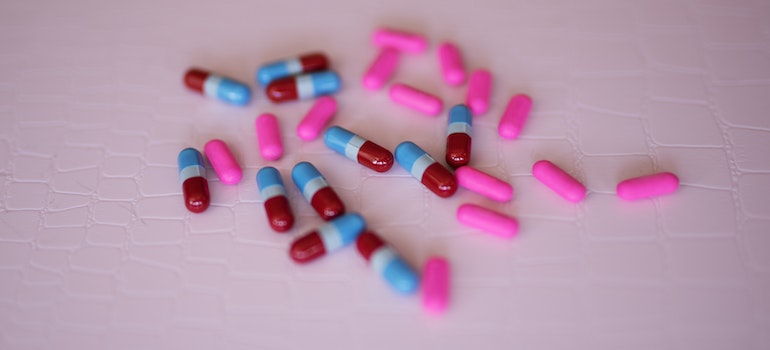
The impact of PTSD on addiction
PTSD and substance abuse in veterans do not normally develop simultaneously. Rather, soldiers tend to develop PTSD due to their experiences in combat. Then, either during their active duty or after transitioning into civilian life, they find their symptoms too difficult to manage. This leads them to turn to drinking and drugs to mitigate the symptoms of their condition.
Unfortunately, substance abuse tends to exacerbate the symptoms. Many substances cause side effects similar to the symptoms of PTSD, especially when used over a prolonged period of time – sleep disturbances, anxiety, paranoia, emotional numbness, and negative thoughts all appear as a consequence of both addiction and PTSD. Not only will this make the effects of both PTSD and substances worse, but it will also make treatment harder. A combination of PTSD and SUD makes both conditions more complex. To return to a normal life, you will therefore need to invest more time and effort into recovery.
PTSD and substance abuse in veterans: the statistics
In the United States, military personnel receives special benefits in return for their service. It is the US Department of Veterans Affairs (the VA) that is tasked with providing these benefits, offering assistance to veterans, and advocating for veterans’ needs. A part of that advocacy relies on collecting and disseminating important information about the lives that veterans live upon their return to the States. Statistics on PTSD and substance abuse among veterans are a part of that information.
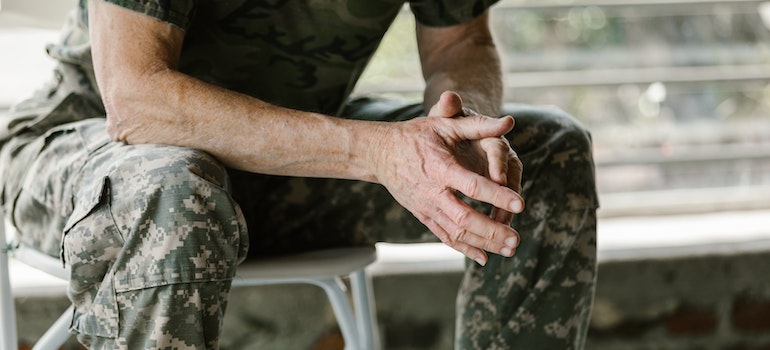
The prevalence of PTSD among veterans
Around 5% of the population suffers from PTSD at any given time. Among veterans, the prevalence of PTSD varies by service era but is typically at least twice that of the general population. Of those who served in operations in Iraq, between 11% and 20% have been diagnosed with PTSD. Among Gulf War veterans, the prevalence of PTSD is 12%. Of the surviving Vietnam War veterans, around 15% have received a diagnosis of PTSD, but it is estimated that at least 30% actually suffer from it. Up to 31% of veterans who served in Afghanistan experience PTSD upon their return.
Overall, around 30% of veterans and active duty service members struggle with PTSD. For those who served after 9/11, the number is even higher – up to 83% of all service members over the last 20 years have experienced PTSD at some point. The condition is about twice as common in female service members as it is in male soldiers.
The prevalence of addiction among veterans
Between 15% and 17% of the US adult population (aged 12 or older) abuse substances. The rates among veterans are similar to the general population but vary depending on age and compounding risk factors. Between 10% and 20% of service members struggle with alcohol or drug addiction, the majority of them veterans. Active duty military members are less likely to develop an addiction due to the controlled environment and random drug testing that the military employs. However, once you transition into civilian life and lose protective influences, you become more likely to abuse substances.
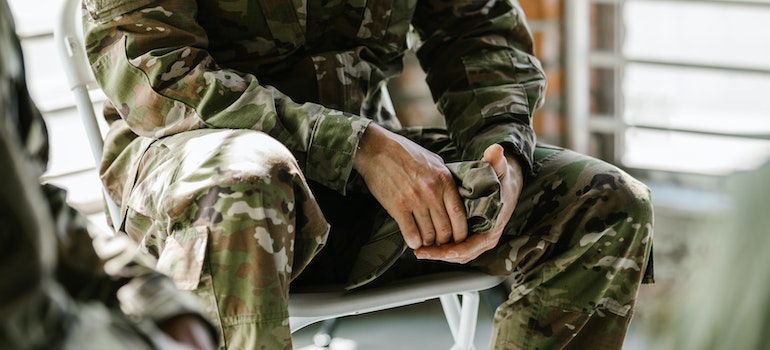
Overall, substance abuse among current and former members of the armed forces is on par or lower than in the general population. However, among the younger service members (ages 18-25), the prevalence of addiction is higher than in the general population. Veterans are also more likely to experience chronic pain, debilitating injury, trauma, suicidal thoughts, and homelessness – all of which are risk factors for addiction.
The co-occurrence of PTSD and addiction, however, is more common among veterans:
- more than 20% of veterans who do suffer from PTSD also develop an addiction
- almost a third of veterans who struggle with addiction are also diagnosed with PTSD
- as many as 60% of veterans with PTSD smoke, compared to only 30% of veterans without PTSD
- veterans with PTSD are more likely to binge drink than veterans without PTSD
Preventing PTSD and substance abuse in veterans
Service members are, by nature of their profession, more likely to suffer trauma than the average person. Consequently, they are more likely to suffer from trauma-related health issues and need treatment for depression, anxiety, PTSD, or even chronic pain. Removing that risk entirely would be impossible. However, it is possible to lower the risk of them developing PTSD and, consequently, addiction. We can never know which trauma will cause PTSD or who will develop PTSD. But what we do know for sure is that having a support system and going to therapy significantly lowers the risk of PTSD and addiction in veterans. Some of the things that help military personnel process trauma include:
- continuous contact with important people in their life
- peer support from other military personnel
- talking about the trauma (with a loved one, a peer, or a therapist)
- experiencing and expressing their feelings rather than suppressing them
- talk therapy both during and after their service
- focusing on the positive (finding meaning in survival, celebrating life, seeking out positive experiences)
Veterans typically turn to substances to self-medicate for the mental and emotional pain due to trauma. It is important to provide alternatives to that. If you have someone to turn to, someone to talk to, someone to help you through your recovery and the transition into civilian life, then you won’t need drugs or alcohol.

Treating PTSD and substance abuse in veterans
The systems that are currently in place to help veterans are unfortunately lacking. Many veterans struggle to access the mental health care that they need upon their return from duty. For this reason, the prevention part of the equation doesn’t always work. Instead, veterans may need to seek treatment for PTSD and addiction. Luckily, addiction treatment can help veterans who are struggling. A form of addiction treatment known as dual diagnosis treatment specifically focuses on treating co-occurring disorders such as PTSD and addiction simultaneously. This allows treatment to address not only both of the disorders but also the interplay between them. As a veteran with both PTSD and SUD, you can greatly benefit from group and individual therapy that targets precisely that combination of conditions.
Recovery from PTSD and substance abuse in veterans
PTSD and addiction are hard enough to recover from individually; a combination of the two only makes treatment more complicated. But it’s important to keep in mind that recovery is indeed possible. There are plenty of success stories from veterans who got sober after dealing with addiction and PTSD and now live normal lives. Of course, it takes time, effort, and dedication to therapy to come out to the other side. Through it all and for a while after, you’ll also need support from family and friends. But it is possible to come out to the other end and live a happy, sober, undisturbed life. Use that knowledge to motivate you to seek help and stay in treatment!
What to do if you are a veteran suffering from PTSD and substance abuse?
If you have served in the armed forces and now suffer from PTSD and addiction, you don’t have to suffer alone. Help is there when you need it – you just need to take the first step and reach out. You can even start the process while you’re still deployed – telepsychiatry has opened the door to remote therapy that you can access anywhere in the world.
Recognizing you have a problem
Not recognizing the signs of PTSD and addiction or, worse yet, being in denial about them can delay treatment and put you at a higher risk of long-term consequences (such as liver problems due to drinking, permanent changes to brain chemistry as a consequence of drugs, and even physical illness caused by living under stress). So it’s important to be mindful of and honest with yourself about what you’re experiencing.
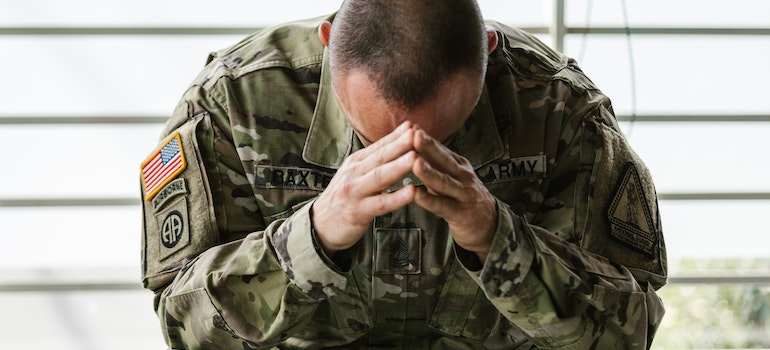
These are the signs of PTSD that you should be on the lookout for:
- you have trouble sleeping
- when you do sleep, you have nightmares about your experiences, and when you’re awake, you experience vivid flashbacks
- you struggle with controlling your emotions or responding to them – you seem to jump from one emotional extreme to another and act on your emotions without thinking
- things that previously didn’t bother you cause you distress because they remind you of traumatic events
- you always feel on edge
- alternatively, you feel distant and numb all the time
These are the signs of addiction that you should be on the lookout for:
- binge drinking regularly (drinking a significant amount in a very short time)
- overusing prescription medication or using prescription medication in ways contrary to medical advice
- using illegal or illegally obtained drugs like heroin, LSD, MDMA, cocaine, or black-market fentanyl (even just occasionally)
- prioritizing substances over work, education, family, friends, and hobbies
- not enjoying the things you used to if substances are not involved
- not being able to stop drinking or doing drugs despite trying
- craving substances when you haven’t used them in a while
- experiencing symptoms of withdrawal when you haven’t used substances in a while
Seeking help
Once you admit that you have a problem, you must also admit that you need help. PTSD and substance abuse in veterans are difficult enough to recover from with treatment – alone, it’ll be even more of an uphill battle. So ask for help before it’s too late. Talk to a trusted friend or family member; their support alone can be helpful, but it can also give you the strength to look for professional treatment for depression, anxiety, and PTSD. Then, when you’re ready, look for a residential rehab in Texas that can help you get sober. A controlled setting, peer support, and professional treatment are the perfect solution for veterans who struggle with addiction. The staff at your nearest addiction treatment center will surely be more than happy to help you with the admissions process.
Explore your options!
There are plenty of options for veterans in need of addiction treatment. Inpatient and outpatient programs are not only available at private addiction treatment centers but often also at your local VA and even some non-profit organizations. As a veteran, you have healthcare coverage that includes addiction treatment. So look for treatment options fully or at least partially covered by your healthcare plan if money is an issue for you. Many peer support groups are also free, including AA and NA meetings.
Committing to recovery
If you want to leave addiction behind, you will need to start prioritizing your recovery. Sometimes, this means making some sacrifices. You may, for example, have to spend time away from your family again while you attend an inpatient program and go through medical detox in San Antonio. Or you might have to give up eating out for a while so that you can afford the treatment you want. Not to mention that certain lifestyle changes will be necessary. Most individuals in recovery are urged to avoid temptation by not attending social events or locations where alcohol and drugs are common and limiting contact or cutting ties with people who might endanger their recovery. This can result in losing a few friends on the way. But at the end of the day, it will all be worth it because your sobriety is worth the sacrifice.

What to do if a veteran you know suffering from PTSD and substance abuse?
If you have a friend or family member who has served in the armed forces and came back different, you’ll probably want to know how to support them best. The first thing you need to know is that it takes patience and understanding. You cannot help someone who doesn’t want to be helped, so don’t force the issues. The best thing you can do is to be there for them for as long as it takes.
Recognizing the problem
It seems contradictory, but signs of PTSD and addiction in a veteran can sometimes be more obvious from the outside. People who suffer from mental disorders like PTSD and SUD are often in denial about it; veterans may also fear being judged or feel shame over admitting they are struggling because they don’t want to be seen as weak. So keep a close eye on the veterans you know. Are they acting like themselves? Do they experience sudden mood swings, seem to disassociate often, or jump at every sound? Then they may be suffering from PTSD. If you also notice that they’re drinking more, medicating more, or exhibiting mental and physical signs of substance abuse, you should consider the possibility of addiction too.
Offering help
If you suspect PTSD and substance abuse in veterans you know, approaching the issue the right way is very important. You don’t want to come off as judging or shaming them. This will only make them defensive, and they might push you away instead of accepting help. So talk to them honestly and openly but make it clear that you love them and will support them unconditionally.

If you’re feeling optimistic, you can also read about your local addiction treatment center beforehand so that you are ready with rehab options when the time comes or offer to help them with medication management to make things easier for them. But if the conversation is not going well, don’t push it – don’t try to threaten or set ultimatums as a way to get someone into treatment. Not only is this a bad way for treatment to start, but it may also alienate your loved one and cause more problems in the long run.
Being supportive
The best way you can help someone you know who is battling PTSD and addiction is to be there for them. This sounds too simple to work, but a strong support system is vital to recovery. Veterans who have someone to rely on are less likely to develop PTSD, less likely to turn to substances, and more likely to recover from both. So your job as their loved one is simply to love and support them. Be the person they can trust with everything without fearing judgment. Show them that you accept them, respect them, and care about them. You’d be surprised by how much of a difference this alone makes.
Helping veterans with PTSD and substance abuse problems
PTSD and substance abuse in veterans is not a problem that can be solved one person at a time. Wide-scale assistance and reform are necessary to provide better care for those returning from service. So if this is an issue you care about, make your voice heard. Vote for politicians whose platforms center on veterans’ affairs, run in your local elections, or volunteer for non-profit organizations that benefit veterans. And if you don’t have the time for all that, at least support your local addiction treatment center through donations and volunteer work. You can make a difference in the lives of dozens of men and women who served our country and help them live better, healthier, and happier lives.

